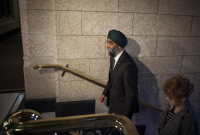Defence Minister Harjit Sajjan says he could have gone to a fundraising dinner for Afghan war veterans this week to make amends for how he described his role in that conflict.
But preparing for a speech Wednesday on the future of Canadian defence spending was more important, Sajjan told The Canadian Press in an interview Wednesday.
"With veterans, with soldiers, I’m going to have many opportunities," he said. "As a minister, I am not here to step away from anything, I am here to own my mistake, but I also have a job to do to deliver for them."
In a speech in India last month, Sajjan described himself as the "architect" of Operation Medusa, a major combat offensive in Afghanistan in 2006.
The 15−day battle was overseen by then major−general David Fraser who was in charge of all NATO forces in southern Afghanistan. That Sajjan would describe himself as the architect raised eyebrows in military circles and, despite repeated apologies, he’s faced opposition calls for his resignation for days.
The Opposition Conservatives described his decision to skip the veterans’ dinner as going into hiding.
"Last night, the defence minister had the perfect opportunity to personally apologize to veterans of the Afghanistan campaign at a fundraiser for Afghan vets," interim leader Rona Ambrose told the Commons on Wednesday.
"He was supposed to be there but, clearly, he felt so uncomfortable that he cancelled."
Sajjan’s office had said Tuesday that a scheduling conflict prevented the minister from attending.
In the interview, Sajjan said his schedule had filled up with "other things," and he needed to prepare for Wednesday’s remarks and the defence policy review, a blueprint expected to be released ahead of this month’s NATO meeting.
"I wanted to make sure that I’m well prepared for it," he said. "I’m going to be judged by my actions. I’m a minister of national defence and I need to make to sure I deliver on that and that’s what I will do and when the defence policy is launched, I think there will be a very strong message on that."
The speech in India wasn’t the first time Sajjan has used the term architect; he told an interviewer in 2015 that chief of defence staff Jonathan Vance also referred to him that way.
Vance has refused to comment, saying only that the minister has apologized and he views the matter as closed. Sajjan wouldn’t say Wednesday whether Vance had actually used that phrase.
"A lot of people characterized my role in different ways," Sajjan said.
His job, Sajjan said, defied a singular definition. His task was figuring out the extent of the presence and strength of the Taliban in the area immediately outside Kandahar City known as the Panjwai district.
Upon arrival in Kandahar, Sajjan began co−ordinating a weekly security leaders meeting held at the governor’s palace. From those, he was able to glean information that he later followed up on during trips into the district over the spring of 2006.
Understanding local grievances, the extent of the infiltration of the Taliban — he once caught a district governor stealing a man’s bicycle — and also helping Canadian soldiers piece together the information they were gathering were all part of his job and helped inform the operation, he said.
Sajjan said he understand the furor around his remarks. But he won’t explain why he said what he did.
"I can go through what was going through my head, all of those things, but at the end of the day I still made a mistake and once you make a mistake it’s about don’t make excuses, own it, acknowledge it first of all, and then learn from it and carry on," he said.
"And the other thing, you shouldn’t be talking about what you’ve done. I should be praising other people’s work."





Comments